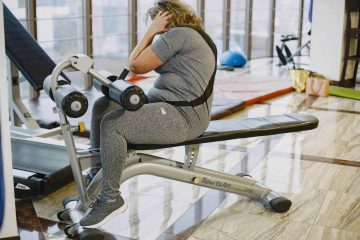
How to identify stomach pain
Everybody experiences stomach pain at one time or another. You may feel a sharp, constant ache or a cramping sensation.
While abdominal pain can occur in any time, it is possible to feel it more frequently in the mornings. It could be something you ate that night, inflammation, or the intestines getting ready for a bowel movement.
Morning stomach pain is not something to be concerned about. However, a persistent ache should not be ignored. Permanent pain can indicate a serious condition, so get medical attention right away.
Why Does My Stomach Hurt When I Wake Up
1. Ulcers
A stomach ulcer is an inflammation of the stomach lining. It can cause dull or burning pain in your stomach’s middle, between your belly button and chest.
Although pain can occur at any time, it is possible to feel more discomfort in the mornings due to the possibility of stomach emptying.
You can try an over-the-counter anti-inflammatory or acid-blocker to relieve your symptoms. However, if you have persistent symptoms or symptoms that persist, you should consult a doctor.
Emergency surgery may be necessary if an ulcer creates a hole in your abdominal wall.
2. Irritable bowel syndrome
Irritable bowel syndrome (IBS), is a condition that affects large intestines. It can also cause pain in the lower right and lower left sides of the stomach. You may also experience the following symptoms:
- Constipation or diarrhea
- Excessive gas
- Mucus in the stool
- Bloating
IBS can be triggered by certain foods or stress. If you are worried about school or work, you might experience worsening symptoms.
IBS is a condition that cannot be treated. Lifestyle changes can help improve your symptoms. Avoid trigger foods such as:
- dairy
- Carbonated beverages
- Fatty or fried foods
These are some other good lifestyle choices:
- getting regular exercise
- Stress management
- You can take a fiber supplement, or an anti-diarrheal medicine.
IBS sufferers can take some medications. Talk to your doctor if you aren’t seeing improvement with home remedies.
3. Inflammatory bowel disease
IBD (inflammatory bowel disease) refers to two conditions, Crohn’s and ulcerative colitis. Both conditions can cause stomach pain near the lower right abdomen or around the belly button. Some people also experience morning pain.
Crohn’s disease affects the whole digestive tract, and can cause other symptoms such as:
- diarrhea
- weight loss
- anemia
- nausea
- Fatigue
Certain foods and drinks, like carbonated drinks and high fiber foods, can worsen symptoms.
Ulcerative colitis affects the colon and is also known as large intestine. The following symptoms are common:
- bloody diarrhea
- Increased urgency in the bowel
- Low energy
- weight loss
There is no cure for IBD. The goal of treatment is to reduce inflammation and improve symptoms. Your doctor might prescribe an anti-inflammatory medication or an immunosuppressant.
A food diary can help you identify foods and drinks that can trigger flare-ups.
4. Constipation
Constipation is defined as a person who has fewer than threeTrusted Source stool movements per week. Unsolicited bowel activity can cause severe cramping in your lower abdomen, especially in the morning and other times of day.
Other symptoms include straining for a bowel movement, or feeling like you haven’t fully empty your rectum.
Constipation can be caused by a sedentary lifestyle. An increase in physical activity can provide natural relief by stimulating intestinal contractions. You may also find relief by taking a stool softener, fiber supplement, or eating more fruits, vegetables, etc.
Consult a doctor if constipation lasts more than two weeks.
5. Pancreatitis
An inflammation of the pancreas may cause pain in your upper abdomen and radiate to your back. Sometimes, the pain can be worse after eating so it is possible to feel discomfort after having breakfast.
You may also experience nausea, vomiting, or a fever. For persistent pain that does not improve, visit a doctor. Mild pancreatitis can be treated with over-the-counter pain relief or on its own.
Your doctor might prescribe medication to reduce inflammation or an enzyme supplement that helps your body absorb nutrients from food. A low-fat diet can help prevent future flares. You can include foods like:
- fruit
- Whole grains
- vegetables
- lean protein
6. Diverticulitis
Diverticular disease refers to small pockets or sacs that form in your large intestine wall. Diverticulitis is when one of these sacs becomes infected, inflamed or causes pain in the lower left abdomen.
You may also experience the following symptoms:
- Constipation
- Fièvre
- nausea
- vomiting
Diverticulitis can cause symptoms. For persistent and severe pain, you will need to seek medical attention. You can get an antibiotic from your doctor to manage the infection. Or, you may need to have an outpatient procedure to drain the abscess.
Surgery may be required in severe cases to remove affected colonic tissue. Diverticulitis pain can be more severe in the morning, but it will improve after passing gas and having bowel movements.
7. Gallstones
Gallstones are deposits of digestible fluid in the gallbladder. While some people have no symptoms, others experience intense pain below the breastbone or in the upper abdomen.
The right shoulder and shoulder blade can also be affected by pain. For severe, sudden abdominal pain, consult a doctor. Your doctor may prescribe medication to dissolve gallstones. If your symptoms don’t improve you may need surgery to remove your gallbladder. The pain may get worse in the mornings and at night.
8. Allergies to food
Stomach pain can also be caused by food allergies. Common food allergens include:
- dairy
- Shellfish
- wheat
- Gluten
- nuts
An allergic reaction to food can lead to symptoms such as:
- stomach cramps
- vomiting
- nausea
- Hives
- Wheezing
- dizziness
- The tongue swelling
Stomach pain due to a food allergy can be more severe if it occurs in the morning. However, symptoms can also occur at any time of the day.
Celiac disease
Celiac disease is an autoimmune disorder where gluten causes inflammation in small intestines. You may experience stomach pain and other symptoms such as:
- diarrhea
- Gas
- Bloating
- anemia
Some symptoms of food allergies, including hives, swelling, itching, may be relieved by an antihistamine. It is important to avoid food allergies as severe reactions can lead to anaphylaxis.
This can lead to dangerously low blood pressure and breathing difficulties.
If you experience hives, itching or wheezing following eating certain foods, consult your doctor. A skin test or blood test can be used to confirm or rule out food allergies.
9. Indigestion
Indigestion can lead to pain in the upper abdomen, nausea, and bloating. Remember that indigestion can be a sign of another condition such as acid reflux, ulcers or gallbladder disease.
You may feel stomach pain after eating. If indigestion persists for more than 2 weeks or is accompanied by weight loss or vomiting or black stool, consult a doctor.
Indigestion may be improved by eating smaller meals, exercising regularly, and managing stress.
10. Inflammatory disease of the pelvic floor
An infection of the female reproductive system can lead to:
- lower pelvic pain
- Fièvre
- vaginal discharge
- Intercourse or painful urination
It can happen at any hour of the day. However, for some women it might be in the morning.
If you have stomach pain, fever, or a foul-smelling vaginal discharge, consult your doctor immediately. PID is usually caused by bacteria, so your doctor might prescribe antibiotics.
The bottom line
Although stomach pain is common for everyone, it’s important to not ignore any persistent, sudden or worsening stomach pain. Get immediate medical attention if you experience vomiting, bloody stool, or stomach pain.
Morning stomach pain could be caused by constipation, gas, or a medical condition that requires special diets, prescription medications, or surgery.
Soursop Leaves Benefits: Nature’s Gift for Better Health
November 19, 2025Does Muscle Weigh More Than Fat?
November 13, 2025
Leave a reply Cancel reply
You must be logged in to post a comment.
-
How to Remove Fiberglass from Skin
February 10, 2022 -
15 Signs That Your Home Needs Mold Inspection and Testing
January 10, 2024 -
Hyperchloremia: What Are the Causes of High Chloride Levels?
August 5, 2025





